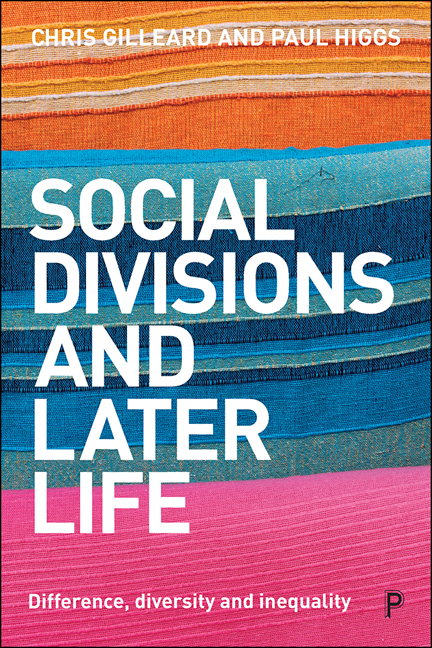Book contents
- Frontmatter
- Contents
- List of Figures and Tables
- Preface
- 1 Social Divisions and Social Differences
- 2 Social Class and Inequality in Later Life
- 3 Ageing and Gender
- 4 Ethnicity, Race and Migration in Later Life
- 5 Disability and Later Life
- 6 Identity and Intersectionality
- 7 Diversity, Difference and Division in Later Life
- References
- Index
7 - Diversity, Difference and Division in Later Life
Published online by Cambridge University Press: 25 February 2021
- Frontmatter
- Contents
- List of Figures and Tables
- Preface
- 1 Social Divisions and Social Differences
- 2 Social Class and Inequality in Later Life
- 3 Ageing and Gender
- 4 Ethnicity, Race and Migration in Later Life
- 5 Disability and Later Life
- 6 Identity and Intersectionality
- 7 Diversity, Difference and Division in Later Life
- References
- Index
Summary
The central argument of this book is that later life is no longer an unmarked social category, defined and determined by its position at the end of a life already lived. If old age was ever such a straightforwardly structured social category, it is certainly not so now. It occupies a much more interesting social space than that. Not only do most people in the developed economies reach old age, but having reached it, most can reasonably expect to find their journey continue through it. Later life is expanding, in its length and in its diversity, creating a greater variety of ways of being an older person and living a later life. This, it is argued, constitutes a radical change, which is intimately linked with broader social changes associated with what Ulrich Beck called the transition from ‘first’ to ‘second’ modernity (Beck and Lau, 2005). The homogeneity of the older population, once taken for granted by policy makers as they legislated to secure old age, has since imploded. It is increasingly difficult to create a unitary set of policies capable of achieving ‘a happier old age’. Faced with the diversity and contradictoriness of later life, no singular categorisation of old age is sustainable, whether by markets, states or the service sector. No longer the residue of a life left over after the operations of a society of producers had done its work, later life extends into ever-widening social arenas. Consumerism and its lifestyle distinctions, the growth and multiplicity of social identities, the changing demography of the life course, the competing forms of community and the shift from collective social rights to individual human rights have all combined to transform later life beyond its earlier ordering as the secured end of a modern life.
Later life is not without its boundaries. It is still constrained by the institutions of first modernity as well as by the sheer weight of the body's own ageless ageing. The chapters of this book have tried to capture this duality, of later lives led differently, still shaped by the structures of the past but now fashioning themselves to face the challenges of the future. Many aspects of later life can be understood as the echoes of lives lived within the social divisions and structures laid out by prior experience.
- Type
- Chapter
- Information
- Social Divisions and Later LifeDifference, Diversity and Inequality, pp. 141 - 162Publisher: Bristol University PressPrint publication year: 2020



